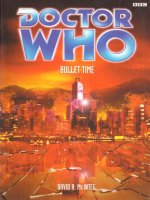English stories 45 bullet time (v1 0) david a mcintee
Bạn đang xem bản rút gọn của tài liệu. Xem và tải ngay bản đầy đủ của tài liệu tại đây (1.08 MB, 248 trang )
BULLET TIME
DAVID A McINTEE
Published by BBC Worldwide Ltd,
Woodlands, 80 Wood Lane
London W12 0TT
First published 2001
Copyright © David A. McIntee 2001
The moral right of the author has been asserted.
Original series broadcast on the BBC
‘Doctor Who’ and ‘TARDIS’ are trademarks of the BBC
ISBN 0 563 53834 1
Imaging by Black Sheep © BBC 2001
Printed and bound in Great Britain by Mackays of Chatham
Cover printed by Belmont Press Ltd, Northampton
CONTENTS
Prologue
1 - Life on the Streets
2 - Scene of the...
3 - Silent Services
4 - A Jungle Out There
5 - Being Careful Out There
6 - Speaking Louder Than Words
7 - H K Confidential
8 - The Devil You Know
9 - Badfellas
10 - Early Warning System
11 - Seeking Here. Seeking There...
12 - Proof Denies Faith
13 - Lost Gleaming
14 - Every Silver Lining Has A Cloud
15 - A Line Must Be Drawn
16 - Dining on Ashes
17 - Entering and Breaking
18 - True Colours of a Hero
19 - The Only Way To Be Sure
20 - The Cortez Factor
21 - Face to Face
22 - Still Waters
23 - Full Contact
24 - All Bad Things...
Epilogue - Freedom
About the Author
‘Whenever truth conflicts with legend, print the legend.’
– William Randolph Hearst
‘I shall not be the cause of disharmony among my sworn
brothers by spreading false rumours about them; if I do I shall
be killed by a myriad of swords’ – traditional Triad oath 23.
Prologue
They say that history is written by the victors, but that’s not
strictly true. History is sometimes written by appointees of the
victors, or followers of the victors. Even fans of the victors.
Sometimes it’s written by those hoping to cash in on the
victors. Whichever is the case, it’s almost always – at least
while the victors are still in control of things – written by
people who don’t know all the best, juiciest secrets of how the
victors got to be that way.
Victor or not, everyone who spoke of it agrees that this
story began at five to one, on a mild November night aboard a
Ticonderoga-class guided missile cruiser...
The USS Westmoreland’s dog watch was usually quiet, even
in the red-lit Combat Information Centre. Most of the senior
officers would be catching dinner, or doing paperwork, while
a few promotion-hopefuls kept an eye on the computers and
radar screens. You didn’t expect to see much beyond logging
in the regular passage of scheduled airliners overhead.
That was usually. On that night, the CinC was bustling
when Captain Davis answered the summons to duty. The late
call-outs from his cabin had died out a couple of weeks into
the cruiser’s tour of duty, as her crew got used to the Aegis
radar and weapons systems, and to recognising elements that
combined into false alarms. That suggested to him that
tonight’s call was for something more likely to be serious.
Davis exuded an aura of calm as he walked in. Despite the
speed with which he had responded to the call, his uniform
was perfectly neat. This was all showmanship on his part; all
part of the example that he liked to set to his crew. ‘What’s all
the fuss, lieutenant?’
Lieutenant Jones, the Duty Officer for the night, used a
light pen to circle a radar track one of the screens. ‘This one,
sir. Inbound bogey with no IFF signal, about twelve miles out,
altitude three miles.’
‘An airliner?’ Three to five miles was the usual altitude for
commercial flights, and they had certainly tracked enough of
them.
Jones shrugged. ‘That’s what we thought at first, but at
fifteen miles uprange she was five miles high. I don’t think it’s
a coincidence that it’s descending.’
Davis, like the rest of his crew, doubted that this was
anything more than a civilian flight, but he wasn’t stupid
enough to ignore the possibility that it might not be. ‘Have we
picked up any comms traffic from them?’
Jones shook his head. ‘That’s the other thing I don’t like
about this: they’re maintaining a radio blackout. No
transmissions to or from them. If it was an airliner, there
would always be something.’
‘Try and get in touch with them on the local commercial
frequencies. Ask for confirmation of the ID and flight plan.’
Davis turned to a nearby ensign. ‘Get in touch with shore.
Have them check civilian schedules, and find out if this track
matches any filed flight paths.’ He squinted at the radar
display. ‘How far is the nearest carrier group?’
‘Too far, sir. The unknown will get here before an F18
could.’ While the ensign worked, Jones was back at the radar
track. ‘Inbound bogey now ten miles uprange.’
‘Any response to our requests for identification?’
‘Nothing. Maybe they didn’t hear.’
‘You kidding?’ But, there were rules for these kinds of
days. ‘Repeat the dema –’ Davis stopped himself. ‘Repeat the
request, for ID. Try every frequency you can think of, civilian
and military.’
The ensign was back a few moments later. ‘Sir, there’s no
scheduled flight plan on file for any civilian traffic on this
course tonight.’
‘Keep trying.’ Even as he spoke, he willed whomever was
flying that thing to respond. He guessed that pretty much
everybody else was too, except maybe Hennessy. Hennessy
thought Captain Rogers of the Vincennes was a role model.
He’d grown up in the white South, being raised on tabloid
news. Davis wasn’t sure which scared him most.
‘Range now seven miles,’ someone called out. The CinC
was beginning to feel a lot more cramped and oppressive to
Davis, though no-one else had entered. ‘Come on,’ he
muttered. ‘Even telling us to go to hell would make more
sense than this.’
‘Six miles. Descending steadily.’
Davis nodded to Jones, ‘Light them up.’ He hoped that the
shock of being targeted would prompt some kind of response
from the pilot. Within three miles of the ship, any unidentified
aircraft would be considered hostile, and could be attacked at
the commander’s discretion. Davis admitted in his after-action
report that he would rather not have been put in that situation,
but nor would he endanger his ship or crew by not responding
appropriately.
‘Arm a Standard missile.’ He went over to the Ensign’s
station, and picked up a microphone himself. ‘Unidentified
aircraft, this is Captain Davis of the USS Westmoreland. We
have a radar lock on you, and a missile armed. Identify
yourself and alter your heading immediately, or we will be
forced to fire upon you.’
The seconds passed, until Jones announced, ‘No response.
Two-and a half miles, altitude decreasing.’
Davis sighed. It was said that war became easier as the
distance between killer and killed increased over the centuries,
but it didn’t feel easy for Davis. Everyone else in the room
was as calm as clerk in a bank, working at a spreadsheet
instead of a weapons system, but they didn’t have to choose
whether to kill or not.
‘Fire.’
The flash of the rocket launch momentarily lit up the ship, like
a cinematic lightning strike. Then it was gone with a roar, and
only the radar would indicate that a missile was in flight.
On the radar screen, the missile’s track was running true,
directly for the unidentified aircraft. The unidentified aircraft’s
blip wasn’t even trying to evade the missile.
Even so, Davis wasn’t taking any chances that night. ‘Arm
a second missile.’
Three miles northeast of the Westmoreland, the missile hit as
true as anything ought to, with that amount of development
dollars behind it. It rammed home into a gleaming silver
expanse of metal, and burst through. The blast blew out a
ragged exit wound on the other side of the target, which
immediately began to bank, trailing blue fire. The metal began
to shake, as it lost flight stability, and plummeted earthwards.
The smaller blip on the screen converged with the larger one
in a textbook example, and vanished. Less than a second after
the radar screen showed the impact, the larger blip quivered,
as if to break into smaller sections, then vanished.
‘That’s a confirmed kill,’ Jones reported. ‘Whoever it was
has gone down.’
Davis merely nodded, and prayed that his target had
indeed been hostile.
Bangkok, March 1997
It was gone noon when Sarah Jane Smith flagged down a taxi
on Thanon Prachitapai. The mud-coloured interior felt like an
oven and smelled like an old patent-leather shoe. She had to
wind the window down even as she was giving the driver
directions in badly pronounced Thai straight out of a tourist
phrasebook.
When the car set off, the open window didn’t help much
more than psychologically. The wind flooded the car with
spices and sweat, fruit and dust, pollution and heated paint.
Somehow it managed not to be unpleasant; it was exhilarating
rather than repulsive. It was air with character.
The trip to the airport wasn’t too unbearable, though the
heat made Sarah feel uncharacteristically car-sick. When she
got out, it was a blessed relief. The airport was pretty much
like any other she had travelled through over the years; a
polished rat-trap filled with hectic, sweaty masses going
nowhere fast, and falsely smiling vendors looking to sell them
overpriced designer labels before they got there. It was the
modern world in a nutshell, with branches all over the globe.
At least Sarah didn’t have to exert herself with heavy
luggage, as she was there for a strictly local jaunt. She passed
through the Don Muang domestic terminal, to the helicopter
taxi lounge.
The difference between the hectic main terminal and the
lounge mostly seemed to be that the latter was more what
she’d call ‘executive’. Smart suits and immaculate casual, with
nary a rumpled, sweaty tourist in sight. Sarah was less at ease
here for some reason; she identified more with the weary
tourists than with anyone who was able – or willing – to
power-dress for travel before breakfast.
The few people waiting, reading their English-language
papers with a fortified morning coffee, were split into two
types. The Suits were clearly businessmen – most likely in the
tourist industry – waiting for short hops to the resorts or
plantations they managed. The uniformity of their business
garb made her think of yuppie stormtroopers on a battlefield
where nothing was ever quiet on the Exchange front. The rest
were like herself: freshly-pressed slacks or combat trousers,
baggy shirts, and all with a press pass stuffed somewhere in
wallet or handbag.
‘Ah, the star in our midst,’ someone said as Sarah entered.
The Suits all looked up as one, then returned to the financial
pages.
‘Hardly that,’ Sarah protested to the woman who had
spoken. Someone from Singapore TV, if Sarah remembered
rightly.
‘Modest as well,’ a black American man said. He wore a
loose casual suit and looked like he worked out now and again
without being a fitness junkie. He looked about five years
younger than he probably was, if Sarah was any judge. ‘Like it
or not, you’re today’s star of the Press Corps.’ He handed over
a newspaper with a grin that Sarah immediately liked.
‘Syndicated worldwide this morning.’
It was a copy of today’s Bangkok Post. The headline was
‘Sex Tourism Launders Golden Triangle Harvest’. Below the
bylines that proclaimed some of the publications the article
would appear in – the Washington Post, LA Times, Hong
Kong Star – was a small stock photo of Sarah with curlier hair
and a pink suit. She hadn’t expected the photo. Sarah had
never sought that kind of physical recognition; she was a
journalist, reporter and writer, not a news anchor. If she
wanted fame she would have taken up that offer to present
Tomorrow’s World. ‘Probably the worst picture I’ve ever had
taken.’
‘Here for the trip to Phanom Rung? Ms Smith?’
‘Sarah,’ she replied. ‘And yes. A piece about the Khmer
monuments for Metropolitan. Though why I still bother to
write for a magazine whose publisher changes personalities
more often than he changes his shirt... Habit,I suppose.’
‘I know the type. My name’s Tom; Tom Ryder.’ He
offered a hand, and she shook it. ‘Going out to take a few
pictures for National Geographic.’ His attention went
somewhere beyond her. ‘Looks like you have a great sense of
timing.’
‘The flight to Phanom Rung,’ a voice said behind her,
‘will be leaving in twenty minutes.’ It was a balding man with
a Thai Helo Services ID tag on his blazer.‘But the helicopter is
ready if anyone needs to board early.’
‘Time for one last drink,’ Tom said, with an expression
that made the line a tempting invitation.
‘It’s a little early for me, thanks. Actually I’d like to go
and get aboard. You never know what stories you might get
from the pilots. New leads, places they’ve been; that kind of
thing.’
‘I’ll catch up with you in twenty minutes, then.’
Sarah nodded, and went towards the door to the helipad.
The man with the Helo Services ID fell into step with her.
‘Welcome aboard, Miss Smith. I trust the flight will be
pleasant.’ He gestured towards Sarah’s ride. It was a red and
white executive helicopter, the sort of thing that shuttled
Richard Attenborough and company around in Jurassic Park.
The pilots were visible through the canopy, doing whatever it
was that pilots did before takeoff.
‘How many of us are there for this flight? Is it full?’
He shook his head. ‘Just the six of us today.’ Sarah
stepped aboard. Though the helicopter had looked small from
the outside, there was plenty of legroom, and Sarah suspected
that it could probably fit in twice as many people. The seats
were soft and comfortable, with a large floorspace in the
centre. A couple of red parachutes were strapped to the rear
bulkhead.
‘It looks pretty cosy, actu –’ Sarah’s words were cut off as
the man clamped a chemical-scented pad over Sarah’s mouth
and nose.
The last thing Sarah remembers of that day is slumping
against his chest, and only then noticing that the picture on the
ID was of a totally different person from the one wearing it.
From then on until she woke up in an ambulance, she knew no
more.
From a police wiretap:
22/04/97.
13:12 (local tine)
<ringing tone>
Respondent: ‘What?’
Caller: ‘It’s Little Prarh.’
Respondent: ‘This had better be important. You’re
interrupting filming, and these girls charge by the hour.’
Caller: ‘We’ve just acquired the gift you wanted.’
Respondent: ‘Ah. Where are you?’
Caller: ‘Still at the airport. We have a _ little extra.’
Respondent: ‘Extra?’
Caller: ‘An American, looking to unwrap your gift for
himself.’
Respondent: ‘Who cares? Take him with you. Drop them
off where we agreed.’
Caller: ‘OK.’
<hangs up>
To hear Tom tell it, in a Wanchai bar that was trapped in a
fifties echo, he was more athletic and resourceful than James
Bond, Arnold Schwarzenegger and Jackie Chan put together.
To hear him tell it, he was a Hero, and you could hear that
capitalisation in his tone. To hear him tell it, you had to endure
a half-drunk shout, desperate to be heard over the scratchy
voices of the locals playing mah-jong on the dented formica
tables.
He had come out of the lounge a couple of minutes after
Sarah, bringing her a cold bottle of Coke to try to smooth the
way with her. When he reached the chopper, he saw that she
seemed to be asleep. Then he noticed the white pad in the
attendant’s hand, and realised otherwise.
‘What are you doing?’ he demanded, trying to check Sarah
for a pulse, and wishing he was armed. The attendant just
swore in Thai, and pulled a gun on him. Tom waded in, trying
to disarm the man. Tom was quite strong, and memories of his
college boxing days came back unbidden to give him the
upper hand. Then something exploded in the back of his head.
The next thing Tom knew, he was slumped in a seat next to
Sarah, and the chopper was vibrating with the effort of
clawing through the air.
Opposite him were the attendant and another man,
carrying a Kalashnikov. It didn’t take Sherlock Holmes to
work out that the Kalashnikov’s butt was what had put him
down. Sarah was still out cold, and he wondered how long the
drug they’d given her would last.
Tom wasn’t allowing himself to be scared, of course. He
had a damsel in distress to protect, so this was no time to be
whimpering. He was pretty fit, had boxed for his college, and
had seen some pretty scary things in his time as a
photographer in South-East Asia. After the minefields in
Cambodia, this wasn’t so bad.
‘Where are we?’ he asked.
‘Over the coast,’ the attendant answered. ‘Don’t worry,
you’re getting off soon.’ His expression and laugh didn’t
inspire any confidence in Tom that the chopper was going to
land first.
‘Why?’
‘You’re in the wrong place at the wrong time. Nothing
personal.’
‘I meant, why have you kidnapped Miss Smith?’
‘She upset somebody she shouldn’t.’ The attendant
prodded Tom’s fallen newspaper with his foot, turning the
headline towards Tom by way of explanation. ‘Anyway,’ he
added, as the engine’s pitch changed, ‘it’s your stop.’
Tom glanced out the window, seeing cloudless sky, and a
very distant ocean impossibly far below. The helicopter had
taken up a hovering position miles from anywhere, and Tom
knew what must be coming next.
The attendant pulled open the large side door, exposing the
passenger compartment to chilly air. Then he hauled Sarah out
of her seat. Tom tensed to move, thinking that maybe a quick
one-two would turn the tables, but the other man jogged his
memory with the muzzle of the Kalashnikov.
Sarah groaned as she was manhandled out of the seat. ‘Is it
time to – Are we there already?’ she asked muzzily.
‘Yes,’ the attendant said. ‘Time to disembark.’ He guided
her to the door. ‘We hope you’ll fly with us again sometime.’
Her legs clearly not yet working, Sarah stumbled forward;
at the last moment, she woke enough to realise the truth.
‘What the –’
‘This’ll be a warning to others with long noses,’ the
attendant snapped. Sarah screamed, trying to get further back
into the passenger compartment, but she was too groggy to put
up much of a fight against the compact attendant.
With a last scream of horror, surely knowing that she was
dead, Sarah vanished from Tom’s view.
Tom knew that time was paramount. Instead of trying to
catch Sarah, as the thugs were prepared for, he headbutted his
guard, wrenching the Kalashnikov from his grasp. In under
two seconds he tore the parachutes from the bulkhead, and
tossed them out the door.
The attendant and copilot were reacting, but with the
expectation that he’d try to jump them and get to the cockpit.
He doubted anybody would have expected him to go the
door’s edge voluntarily; not even after he had flung himself
backwards into the sky. Their astonished faces in the doorway
were a testament to that.
Arcing shoulders-first into free-fall, Tom let rip at the
shrinking chopper above, draining the Kalashnikov’s
magazine in a few heartbeats. With the wind rushing so loudly
in his ears, he didn’t even hear the gunfire; just felt the
weapon judder in his hands, trying to throw him off balance
and into a tumble. Every round spent in the shortest of
moments, he opened his hands and let the gun spin away.
His last view of the chopper was one of it descending,
trailing vapour. Then he was rolling onto his stomach, and
letting his arms fall back, to give him more aerodynamic
control over his fall.
Ahead and below was the pair of parachutes. Further on
was the tiny speck that was Sarah.
Lining himself up carefully, Tom inclined his head,
planing towards the parachutes. He opened his arms as he
swooped upon them, an ungainly hawk snatching silken
rabbits to its breast. It felt more like being brought down by a
quarterback when running at full tilt.
For precious moments, he tumbled head over heels, before
managing to stabilise himself. Below, the distance between
Sarah and himself was widening slightly. Holding onto the
parachutes with whitened knuckles, he planed downwards
once more.
When Tom caught up with her, and slammed into her, it
probably felt like being hit by a car. Worse, it probably felt
like being hit by a car on a twisty roller-coaster, as she and the
thing that had hit her were now tumbling and spinning
nauseatingly.
He was grabbing at her, and she screamed silently, the
sound whipped away almost before leaving her throat. Limbs
were wrapping around her, as if trying to crawl around her.
He shouted to her to be calm and let him help, but there
was no way she could hear him over the rush of wind. His
arms were constricting, and for a moment, she seemed to think
he was taking the world’s most inopportune moment to touch
her up; she flinched instinctively, and he just held tighter.
Then she must have realised he was trying to strap
something onto her. She saw the parachute, and forced herself
to stop struggling, which he could tell wasn’t easy. He was
having trouble forcing the two halves of the main buckle
together.
Tom grinned as Sarah regained control of her hands, and
put them over his, pushing the buckle together until it locked
with a click they both felt. Still terrified, she looked for a sign
of success in the man’s face. He gave her a thumbs-up.
Then he released the grip he had on her with his legs.
Judging by her expression, the release was dismaying, not a
relief. As they started to part, he grinned, genuinely, and
pulled the ripcord, which was now at her shoulder.
There was a rustle like falling trees, and Sarah was hauled
upwards out of Tom’s view. All he had to do then, was strap
on the other parachute, and pull the cord. When he did, a
crushing pair of invisible hands grabbed him under the
shoulders and lifted him onto a gentle current of air, which
deposited him safely to the nearest beach.
Chapter One
Life on the Streets
Hong Kong, April 1997
Lots of people were willing to say they had seen Hong Yi
Chung standing at the congee stall opposite a small
hairdresser’s. Most of them agreed that he was looking cool in
his silk shirt, pressed jeans and shoes polished enough to be
able to look up girls’ skirts. Through the window, Yi Chung
could see Emily Ko shampooing some housewife’s hair. The
girl was slim and had her hair tied with a red ribbon. She
carried herself very confidently, and he liked that.
For all his admiration, he ate his rice glumly, wishing he
could at least walk in and be a customer for her. But the salon
was a ladies’ place only, so he had no chance of introducing
himself that way.
The car horn he was waiting for sounded from across the
street. Ah Fei was waving to him from the car. It was a new
one, and Yi Chung didn’t know whether it was second-hand or
just stolen. He didn’t care, either.
Why don’t you just ask her out?’ Fei asked. He was
shorter than Yi Chung but stockier, with a gap-toothed smile.
He was dressed much like Yi Chung, but in a red shirt instead
of a green one.
‘I can’t. I mean, it’s a ladies’ salon, so I can hardly go in;
and what would she think if I followed her home?’
‘Then forget her. What’s wrong with that girl you’re
seeing at Auntie Yee’s place?’
‘She gives me freebies because I sometimes get her stuff.
It’s not the same thing.’ He wanted... He didn’t even know
what the word was – attachment, belonging? Something like
that, anyway. Fun was fun, but it wasn’t everything.
Fei grunted, and shook his head. ‘It’d be good enough for
me.’
Old car or new, the routine was the same: lead-foot it up
Nathan Road to Yau Ma Tei to shake down the food-stall
owners and building superintendents for their weekly
payments.
They took a left turn at Waterloo Road, not daring to cross
into Mongkok where others exacted similar tributes. Their first
port of call was a small tea house where the owner was
waiting deferentially with an envelope. Yi Chung was glad; he
wasn’t afraid of having to fight, but he preferred it when
people showed some respect from the beginning. Either way,
it was better than working in a warehouse or an office.
By lunchtime they had collected money from a dozen
different businesses, and pounding the pavement was
beginning to take its toll on both of them. ‘Maybe it’s time for
lunch,’ Fei decided.
‘On you?’
‘I paid yesterday. It’s your turn.’
Yi Chung merely shrugged.
Lunch was a burger with fries, washed down with bottled
beer. Yi Chung hardly tasted it; it wasn’t worth paying any
attention to it. The pair had sat down in a booth facing the
door, just in case, but no one they knew had come in. ‘Who is
that girl anyway?’ Fei asked. ‘The one at the hairdresser’s?’
‘Emily Ko. She was at the same school as me, but in a
different class.’
‘Didn’t you try for her then?’
‘I was... with someone else.’ Yi Chung finished his
sentence a little too hurriedly. Ah Fei clearly didn’t believe
him, but neither of them thought it worth mentioning.
‘If you’ve got it that bad, just meet her when she finishes
work. There’ll always be someone to look after Auntie Yee’s
girl.’
‘You?’ Fei’s tone had been unmistakable. Yi Chung didn’t
care for it, suddenly.
Fei shook his head. ‘Only if it’s free. I’ve got some
standards.’
They sipped their beers, Yi Chung seeing Emily’s face,
not Fei’s, across the table. ‘What’s next for today?’ he asked,
once he was sure the subject of Emily was over.
‘Back to the car, and down to Jordan Road. Ah Wing
hasn’t showed up to pay his debts, so Lefty Soh wants us to
chop him.’
‘How much?’
‘Just his hands. Teach him not to steal from his brothers.
Lefty’s money should help pay for your oath-taking.’
Yi Chung rose. ‘OK,’ he grinned. He put down his empty
beer bottle. It rattled on the table-top until he could place it
steadily.
Like the backs of so many apartment blocks, this one was
tainted with litter and rats and uncollected rubbish. Yi Chung
thought for a moment that he was going to lose the lunch he
had so recently devoured, and doubted it would taste any
better when taking the reverse course.
Ah Fei had brought a couple of household kitchen cleavers
with him, and gave one to Yi Chung. It didn’t look that much
of a weapon, but could do horrendous damage to anyone hit
with it. Yi Chung held it too tightly, following Ah Fei as they
went up the grimy stairwell rather than taking the residents’
lift.
Ah Fei peered out on to the fifth floor, then led Yi Chung
along to a door. Yi Chung’s heart raced, though he wasn’t sure
whether it was the thrill of doing something bad, or the terror
of getting caught. He hyperventilated, twitching the cleaver so
he’d be ready to use it. He felt that would be good; that way,
Ah Fei would see he was one of the boys. As Ah Fei kicked
the door open Yi Chung worked up a yell to scream at Wing to
intimidate him.
Yi Chung’s enthusiasm for the job evaporated the instant
the door burst open.
The room was peaceful enough, but smelt like a mix of
chemical lab and abattoir. A chair and a couple of lamps and
ornaments in the apartment had been knocked over, but the
fact that there was no blood didn’t make Yi feel any less
queasy.
He’d seen places trashed before, and attended brutal fights
and choppings, but he had never smelt anything like that
stench before. With the door open, it was dissipating rapidly,
but even after it was gone Yi Chung could still smell it. It
would haunt him for the rest of his life.
‘What the hell?’ Both men held their cleavers in shaking
hands, moving hesitantly through the flat. It was a familiar sort
of place, the wallpaper fashionable a decade ago. In the centre,
a large patch of carpet was burnt, and the low coffee table that
straddled it had collapsed, its glass surface blackened and
bubbled. ‘Wing?’ Fei called hesitantly.
There was no answer. Nor was there anyone in the kitchen,
bathroom or single clothes-strewn bedroom.
‘I don’t like this,’ Yi Chung told his friend.
Fei absently tapped the back of his cleaver against his
other hand, not looking any more sure of what to do next than
Yi Chung felt. ‘If he’s not here, we should wait...’
‘I think he is here.’ Yi Chung pointed to the burnt patch.
Some pale, stick-like fragments were mixed with the ash. A
closer look showed a blackened signet-ring on the edge of the
scorched area. Only then did Yi Chung lose it and run for the
bathroom.
‘Oh shit, man,’ he could hear Fei say. ‘Oh, I...’
Yi Chung was less coherent, but at least he could still
stand. As he wiped his mouth, he saw something glint under a
towel rail. Against his better judgement, he found his hand
picking up the object. It was a slim metal box, the size and
shape of a large cigarette case, but the metal felt warm, and he
could see no joins or hinges. He didn’t know anything about
precious metals, but knew enough about people to hope that if
it had been hidden it might be valuable. At least then he might
get something towards the debt he owed Fei and Lefty for
initiating him into the gang.
In any case, the shock had got to his hands, which refused
to open, and hung on to the new acquisition like a security
blanket.
Desperate to spit out the taste and the smell, Yi Chung
went back in to Fei on legs that were unsure whether to obey
him. ‘Let’s go.’
‘But Lefty Soh...’
‘Maybe he changed his mind and sent someone else.’ Yi
Chung gestured weakly at the scorched remains. ‘Someone
who torched Wing. Come on.’ He wasn’t about to wait to see
whether Ah Fei would follow him; he just ran.
According to the station’s logbooks, it was the next day when
Wing’s name came to the police’s attention. Inspector Katie
Siao’s was the closest free hand to a telephone in the homicide
office of Wong Tai Sin police station when it rang, so she took
the call. Kowloon Homicide.’
She slumped into a chair and started scribbling details on a
small yellow legal pad. ‘What address?’ She nodded, though
only her fellow officers could see this response to the caller.
‘Stay where you are, but don’t touch anything. We’E be right
there.’
There’s no such thing as a private communication line, at least
not to the conspiracy-minded, or those whose professions
require paranoia if they are to stay ahead of the game. Landlines can be tapped, any satellite that relays signals can
retransmit copies elsewhere and cellular networks can be
eavesdropped on by anyone with the right equipment.
The right equipment was arranged in a secure room inside
a nondescript two-storey office block in Mongkok. From the
outside, it looked innocuous enough – plain walls and
darkened windows, with a small parking area. Its workers
arrived in typical city-bound small cars, and wore normal
shirts and ties.
Only inside did the security measures become apparent:
doors that needed a code entered on a keypad to open, cameras
everywhere and armed guards in the uniforms of a mixture of
nations.
In one darkened room a wide selection of the latest
military and scientific communications gear was set up. A man
in military fatigues was listening to the general chatter of
Hong Kong’s communications, while the computers around
him sorted through the din in search of important keywords.
It was an American program, originally, designed for the
FBI back in the 1980s. If a conversation was innocent it was
recorded over, but if the computer picked out a certain number
of keywords, the recording would be flagged for attention by a
human operator. So, for example, if a conversation included
the words ‘bomb’, ‘president,’ and ‘Wednesday’, it would be
passed to someone to judge it as a whole. A separate set of
machines did the same job on emails.
It was impossible for the man on duty to follow any
individual conversation out of the thousands that were
streaming past him in so many different languages, but when
the computer flagged one for his attention it screened out all
the others.
Something chirped, and he picked up a pair of earphones,
replaying the latest message the computer thought might be of
interest.
He made a note of the elapsed time on a DAT system, and
picked up a scrambled walkie-talkie. ‘Sir?’
‘Go ahead.’
‘Possible subject acquisition.’
Chapter Two
Scene of the...
The town was small, with only a couple of hotel bars. Kim
was working in the American Bar, in the hope of earning
enough to fund some further schooling in Phnom Penh. Some
of the girls who had worked there before her had sold
themselves as well as drinks, but Kim wasn’t into that.
She could almost have changed her mind when it came to
the two Australians who were staying this week. They were
both a couple of years older than her, and not bad-looking, for
white guys. They were also generous tippers, which was good
when you were trying to save every penny.
Kim deposited the pair’s latest drinks and saw that they
were trying to spread a map out on their table. ‘Let me help,’
she said, and started shifting empty glasses and the ashtray –
she’d never seen either of them smoke anyway – onto
unattended tables.
‘Thanks.’
‘You’re hiking? Backpacking?’
‘Yeah,’ one replied – she thought his name was Danny.
‘We’re just trying to work out the best route. This border
country is confusing.’
‘The border?’ Kim didn’t like the sound of that. ‘Why do
you want to go there?’
‘Because it’s there.’ The Australian grinned and she could
sense he was waiting for her to laugh, but she didn’t know
why. He looked vaguely embarrassed. ‘Sorry it’s a crap cliché.
We’d just like to explore a bit, and that way looks like it might
be interesting.’
‘No,’ she said quietly, looking around. ‘That way’s
dangerous.’
‘Khmer Rouge, or landmines?’ the other Australian asked.
‘Neither. Bad things happen up there. People who have
stayed here go walking along this path...’ She pointed vaguely
on their map. ‘... And never come back.’
The two guys looked amused, but listened. ‘Last year, this
one guy – a German, I think – went up there. He did come
back, but he was... different. like a zombie or something. He
didn’t remember being here before, and didn’t even know his
own name.’
‘What do you think happened to him?’ Danny asked. She
could see he wasn’t convinced, but at least he wasn’t making
fun of her.
‘Some people say that area is haunted by evil spirits.’ Now
they laughed. ‘Some people,’ she repeated hurriedly. ‘I don’t
know. I just say what I heard because I don’t want to see you
disappear, or come back different.’
‘Don’t worry,’ Danny said cheerfully, ‘We can look after
ourselves. If these spirits don’t bother us, we won’t be
bothering them.’
It was twilight by the time Inspector Siao actually walked into
the apartment. Camera flashlights were popping everywhere,
recording the cheap sofa, the TV and VCR, a dropped mug,
the charred curtains... Most of all, they were feasting upon the
patch of ashes that bisected the coffee table. White string was
pinned out around the latter, delineating its vaguely humanoid
shape.
‘I take it this is the...?’ She couldn’t even call it a body.
‘The remains?’ For all its inhuman appearance, Siao still felt
vaguely sickened by it.
The uniformed officer who had been guarding the door
nodded. ‘If it is even a person. We’re not sure.’
‘Oh, it is.’ That was her instinct talking; instinct honed by
experience. She could tell when she entered a murder scene,
even if nothing outwardly showed. ‘I’m sure the forensics will
tell us that much.’ She patted the officer on the shoulder,
seeing him steady a little. ‘I’ve never seen anything like it
either. Who found the... this?’
The officer consulted his notebook. ‘The building’s
caretaker. He had come in response to a request from the
resident – made yesterday – to check the air conditioning. The









